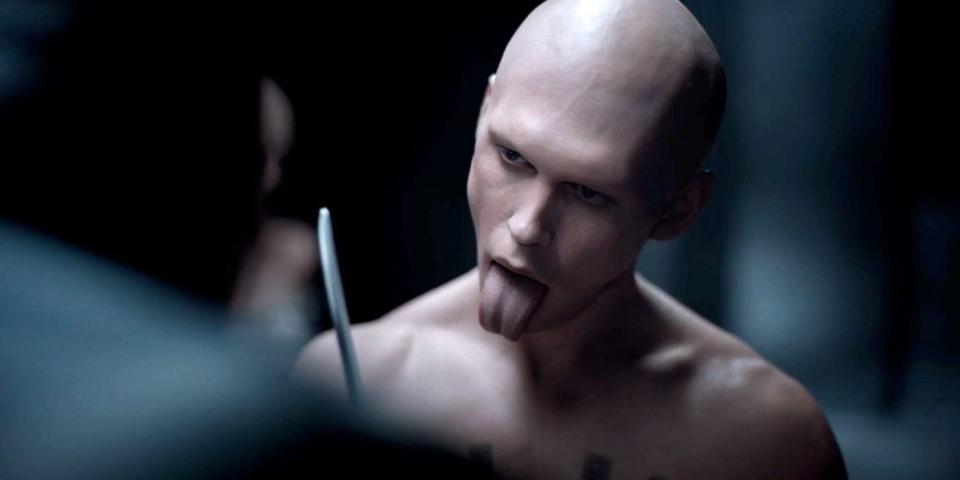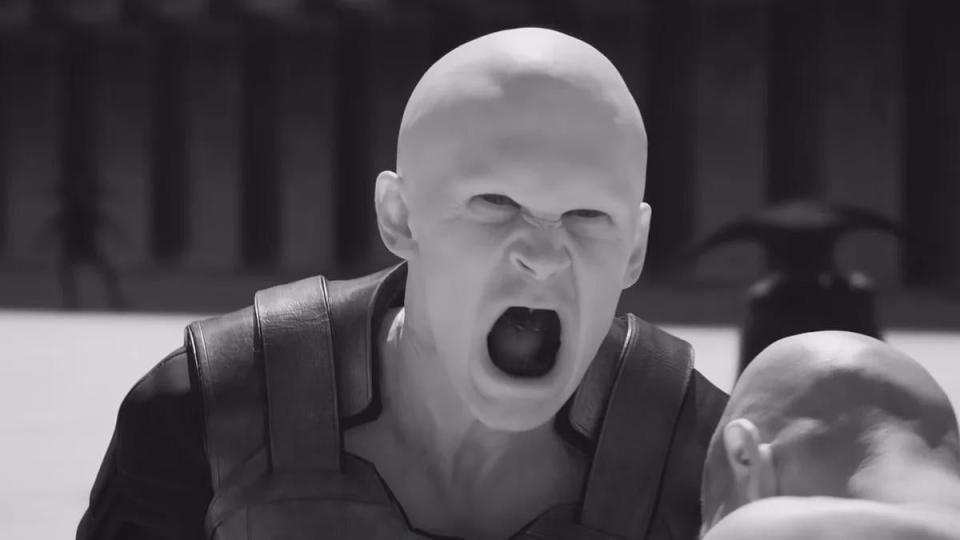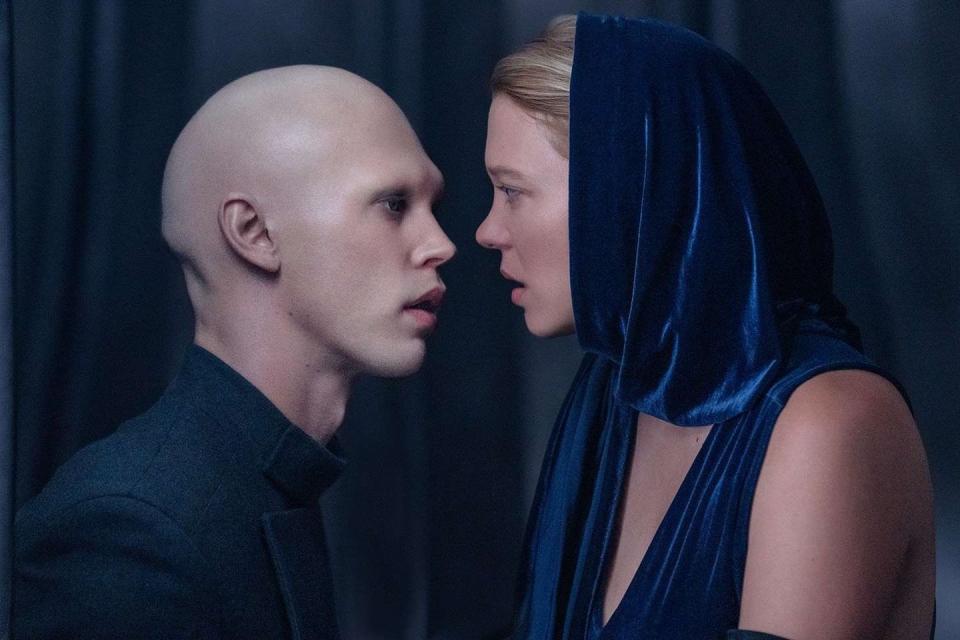Feyd-Rautha in 'Dune: Part Two’ Is a Perfectly Executed Villain
- Oops!Something went wrong.Please try again later.
- Oops!Something went wrong.Please try again later.
"Hearst Magazines and Yahoo may earn commission or revenue on some items through these links."
The following story contains spoilers for Dune: Part Two.
EVEN SOME OF the greatest movies don't have memorable villains. Director Denis Villeneuve has run into this issue before—a creepy Jared Leto is the best the visually-stunning Blade Runner 2049 can do—but has clearly since figured it out. Not only has he now featured Stellan Skarsgård as the diabolical Baron Vladimir Harkonnen in two Dune films, but Dune: Part Two introduces Feyd-Rautha Harkonnen, who, as played by Austin Butler, instantly becomes one of the most dynamic and memorable antagonists in years.
Feyd-Rautha himself is nothing particularly new. He's based on the character from Frank Herbert's classic 1964 sci-fi novel; the psychotic Harkonnen heir has even been depicted by musician Sting in David Lynch's unfortunate 1984 adaptation. But Butler, who last year was nominated and nearly won an Oscar for playing Elvis in Elvis, demands every ounce of attention whenever he’s causing mayhem.
He's introduced with very clear purpose: as a foil to Paul Atreides (Timothée Chalamet). Paul himself is an eventual villain of sorts, but the whole point of Feyd-Rautha is that at least in this vacuum, Paul is the lesser of two evils. And Butler's demeanor makes that distinction very, very apparent. It's the kind of magnetic performance reminscent of people like Heath Ledger (in The Dark Knight) and Butler's Dune: Part Two castmate Javier Bardem (in No Country for Old Men).

Both Villeneuve and Butler deserve credit for making Feyd-Rautha feel ever-present in the film, despite the fact that he doesn't even appear until an hour and 10 minutes in. That's in thanks to a brilliant bit of sequencing: Feyd-Rautha is first teased in a scene between Princess Irulan (Florence Pugh) and Reverend Mother Gaius Helen Mohiam (Charlotte Rampling), where the latter mentions that Paul isn't the Bene Gesserit's only chance to control the imperial power in the universe; Irulan immediately responds, with emphasis, that Feyd-Rautha is psychotic. Our attention is piqued. "Psychotic" is a terrible thing for anyone to be, but it's certainly an interesting trait for a character in a movie to have.

Dune
amazon.com
$8.99
The very next scene gives us our first look at Butler in full pasty white form, and while many jokes were made about his possible inability to drop the Elvis persona, there's not a scent of The King in Dune: Part Two. Instead, we instantly learn the insinuated reputation is quite accurate (and perhaps even an understatement). Feyd-Rautha speaks almost identically to Skarsgård's Baron Harkonnen, is both very bald and very jacked, and is willing to kill anyone in his path with the reckless abandon of a teenager playing Grand Theft Auto. And then there’s his collection of human cannibal "pets," whom he feeds the bodies of his victims to. That'll do it!
Feyd-Rautha is the star of what might be the movie's most memorable set piece: the Harkonnen's home planet of Giedi Prime depicted almost entirely in black and white/infrared imagery. He’s placed in a Gladiator-style stadium with the goal of maintaining his champion status by butchering drugged up prisoners. This time around, The Baron decides to gift him for his birthday—and test him of his worthiness—with a sober former Atreides soldier to take on.
It's thrilling to see Feyd-Rautha realize in real time that perhaps for the first time ever, he's in a fair fight. It's terrifying, then, to see him laughing when that prisoner has a knife to his face, refusing help when his servants attempt to even the odds. Naturally, Feyd-Rautha gains the upper hand, uttering, “You fought well, Atreides," right before he ends the prisoner’s life and leaves victorious.

The bouts of deranged laughter and barking anger are the closest we get to emotions from Feyd-Rautha; he has no reaction, good or bad, to just about anything else. When his heinous uncle is murdered in front of him by Paul later in the film, he doesn't blink. When The Emperor (Christopher Walken) calls upon him for a fight-to-the-death with Paul, his cold, level-headedness doesn't flinch.

Even down to his very final breath—Paul comes out on top, naturally, but not without suffering a few stab wounds along the way—Feyd-Rautha gives away nothing. Butler plays the character with such an effortless, almost rock star cool (Villeneuve at one point compared Feyd-Rautha to Mick Jagger) that watching him do very, very bad things throughout the course of the second half of the movie are among the movie's most energized moments.
Even down to his very final breath—of course Paul is eventually victorious—Feyd-Rautha gives away nothing. Butler plays the character with such an effortless, almost rock star cool (Villeneuve at one point compared Feyd-Rautha to Mick Jagger) that watching him do very, very bad things throughout the course of the second half of the movie are among the movie's most energized moments.
The Reverend Mother tells Lady Jessica (Rebecca Ferguson) at the end of the movie that "there are no sides," and perhaps no character illustrates this better than Feyd-Rautha; maybe that's why he so perfectly fits into this film's story arc. He's killed his mother (we learn second hand), he calls his brother (Dave Bautista) an embarrassment and forces him to kiss his feet, and he almost seems excited to see his uncle stabbed to death before his eyes. His name is "Harkonnen," but that doesn't seem to mean too much at the end of the day.
Dune: Part Two has a lot to say about who's "good," and who's "bad," and that quote—"there are no sides"—reigns, ultimately, over everything. Where there is power, it will be corrupted. But that doesn't mean there's not room a damn good villain arc along the way. And the way Villeneuve and Butler brought Feyd-Rautha to the screen is something movie fans will be thinking about for a long time.
You Might Also Like

